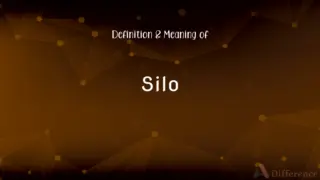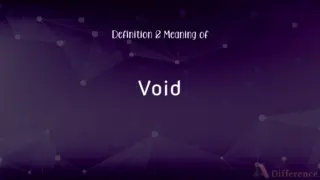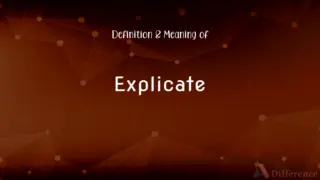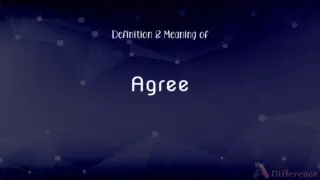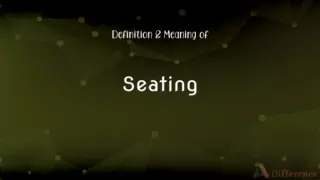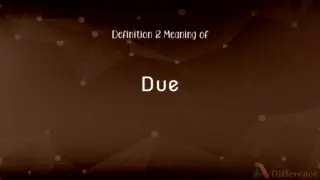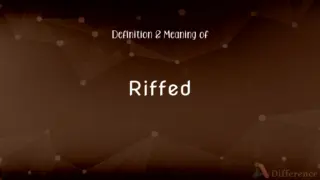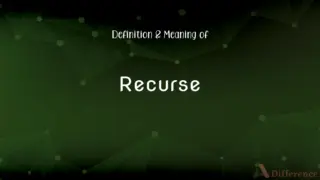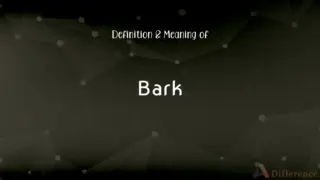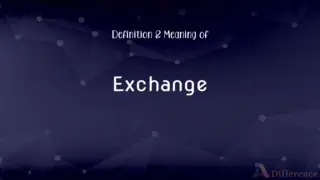Dye Definition and Meaning
By Tayyaba Rehman & Urooj Arif — Updated on March 5, 2024
Dye is a substance used to change the color of something, typically fabric, hair, or food. e.g., She used a natural dye to color her fabric blue.
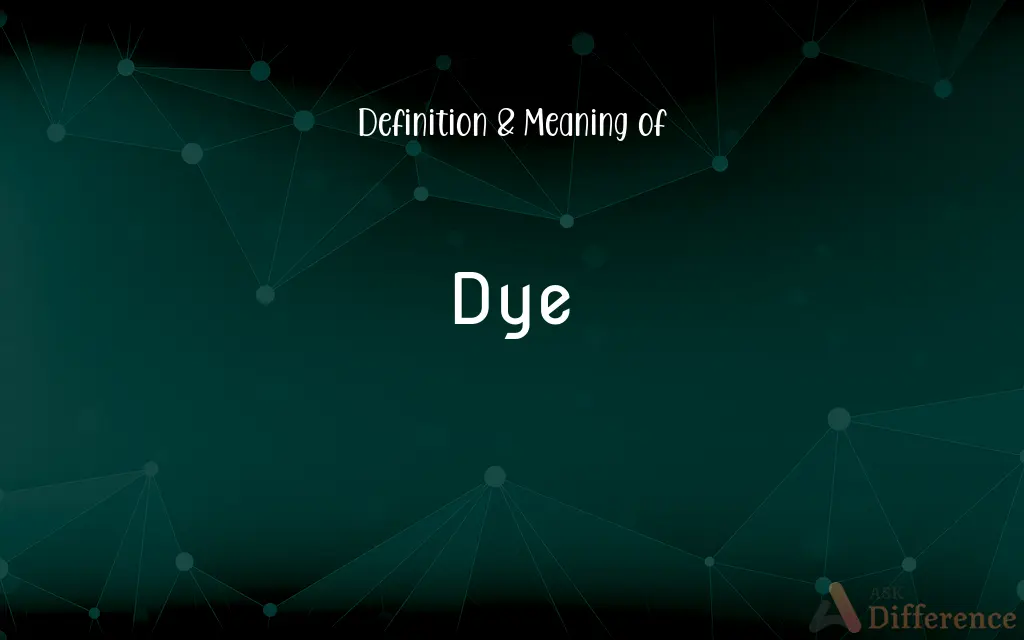
Table of Contents
Dye Definitions
A coloring substance for changing the color of materials.
The artist used a plant-based dye for the textiles.
To add color to something, especially textiles or hair.
She decided to dye her hair red.
To stain or tint a material with color.
The potter used dye to decorate the clay pots.
A chemical or natural substance used in coloring.
The company uses organic dye for its products.
A pigment used in art to color canvases or paper.
He mixed dye to achieve the perfect shade.
To change the appearance of something using color.
She wants to dye the curtains to match the room.
A substance used to color food.
The cake had red and blue dye in the frosting.
To treat with a solution to change color.
They used a special dye to color the wool.
A process of coloring materials for aesthetic purposes.
Dyeing Easter eggs is a fun tradition.
A substance used to color materials. Also called dyestuff.
A color imparted by dyeing.
To color (a material), especially by soaking in a coloring solution.
To take on or impart color.
A colourant, especially one that has an affinity to the substrate to which it is applied.
Any hue, color, or blee.
(transitive) To colour with dye, or as if with dye.
You look different. Have you had your hair dyed?
To stain; to color; to give a new and permanent color to, as by the application of dyestuffs.
Cloth to be dyed of divers colors.
The soul is dyed by its thoughts.
Color produced by dyeing.
Material used for dyeing; a dyestuff.
Same as Die, a lot.
A usually soluble substance for staining or coloring e.g. fabrics or hair
Color with dye;
Please dye these shoes
To impart a new color to something through soaking.
They used to dye fabrics in large vats.
Dye Snonyms
Colorant
A substance used to change the color of something.
The fabric was treated with a natural colorant derived from plants.
Pigment
A material that changes the color of reflected or transmitted light.
The artist mixed her own pigments to create unique shades.
Hue
A color or shade.
The sky at dawn was a beautiful hue of pink.
Color
To apply color to something.
The children loved to color their drawings with bright markers.
Tinge
To impart a slight degree of color to; tint.
The chef tinged the frosting with green to make it look like grass.
Stain
To impart color to (something) by applying a dye.
He stained the wood a dark cherry color.
Tone
A particular quality, way of sounding, modulation, or intonation of the voice as expressive of some meaning, feeling, spirit, etc.
The decorator suggested a softer tone of green for the walls.
Tint
A shade or variety of color.
She added a pink tint to the white paint to warm up the room.
Shade
A slight variation of a color; also, the act of adding color.
She looked for a specific shade of blue for her dress.
Paint
To apply a substance that colors, protects, or adds texture to something, often used as a broader term beyond art.
They decided to paint the old fence to give it a fresh look.
Dye Idioms & Phrases
Cast the dye
To make a decision that cannot be undone; a variation of cast the die.
By signing the contract, she had cast the dye for her new career path.
Dye of truth
The element that gives credibility or authenticity to something.
His firsthand experiences added the dye of truth to his novel.
In a different dye
To present something in a different way or perspective.
The story was told in a different dye, making it seem more dramatic.
Dye in the wool
To hold beliefs or opinions that are so ingrained they are unlikely to change.
His political leanings are dye in the wool; he’s been a party member since his youth.
Dye of tradition
Practices or customs that are deeply ingrained and long-established.
The festival is colored with the dye of tradition, passed down through generations.
With the same dye
In a similar manner or style.
All her novels are written with the same dye of mystery and suspense.
Set the dye
To firmly establish an idea, habit, or trend.
The groundbreaking film set the dye for future movies in the genre.
Indelible dye
A permanent and unchangeable influence or mark.
The early loss of her parents left an indelible dye on her character.
Dye of society
The prevailing attitudes, values, or characteristics of a society.
These laws are a reflection of the current dye of society.
Dye the fabric of life
To influence or shape the nature of one's life or experiences.
Her travels dyed the fabric of her life with rich and varied experiences.
Dye of the times
Characteristics or features that define a particular era.
The architecture of the building reflects the dye of the times in which it was built.
Dye with emotion
To color or influence strongly with emotion.
Her paintings are deeply dyed with emotion, each stroke conveying her feelings.
Dye of imagination
The influence or effect of creativity and inventiveness.
His stories are rich with the dye of imagination.
Dye of culture
The distinctive characteristics and values of a particular culture.
The festival is steeped in the dye of local culture.
Dye the past
To color or influence one’s perception of past events.
Nostalgia often dyes the past in more favorable colors.
Dye the truth
To alter or influence the perception of reality.
His charisma had a way of dyeing the truth, making everything seem more positive.
Natural dye
An inherent or intrinsic quality or characteristic.
Her kindness is not an act; it's a natural dye of her personality.
Blend of dyes
A combination of influences or characteristics.
The city's culture is a rich blend of dyes from various immigrant communities.
Dye of humor
The quality or style of humor that characterizes someone or something.
His writing is marked with a subtle dye of humor.
Dye Example Sentences
Her grandmother taught her how to dye cloth with natural ingredients.
The instructions explained how to mix the dye properly.
She bought a dye kit to color her T-shirt.
The fabric lost its dye after several washes.
The artist chose a bright dye for his painting.
They used green dye for the St. Patrick's Day cookies.
The Easter eggs were vibrant from the various dyes.
The crafts class involved learning how to dye fabric.
The science project was about how plants can be used as dye.
He used blue dye to make the water in the vase look pretty.
After dyeing her hair, she looked completely different.
The new jeans still had the smell of fresh dye.
He was careful not to spill the dye while working.
She was excited to try a new hair dye color.
Her dress was a beautiful shade of dye she created herself.
Common Curiosities
Why is it called dye?
"Dye" is called so because it comes from the Old English "deag" and "deah," which relates to coloring or staining something.
How do we divide dye into syllables?
Since "dye" has only one syllable, it is not divided.
How is dye used in a sentence?
Example: "She decided to dye her hair red."
How many syllables are in dye?
There is one syllable in "dye."
What is the first form of dye?
The first form (present form) of "dye" is "dye."
What is the verb form of dye?
"Dye" itself is the verb form.
What is a stressed syllable in dye?
The entire word "dye" is stressed as it is a single syllable.
What is the root word of dye?
The root word of "dye" is the Old English "deag" or "deah."
What is the pronunciation of dye?
Dye is pronounced as /daɪ/.
What is the singular form of dye?
The singular form is "dye."
What is the opposite of dye?
The opposite of "dye" (verb) could be "bleach" or "strip" (as in color removal).
Is dye a noun or adjective?
"Dye" is primarily a noun and can also be a verb. It is not an adjective.
Is dye a countable noun?
As a noun, "dye" can be countable, as in "different dyes."
Is dye a collective noun?
"Dye" is not typically used as a collective noun.
Is the word dye imperative?
"Dye" can be used in the imperative form, as in "Dye the fabric blue."
Is dye an abstract noun?
"Dye" is a concrete noun, as it refers to a tangible substance.
What part of speech is dye?
"Dye" is both a noun and a verb.
Is dye an adverb?
No, "dye" is not an adverb.
Is dye a vowel or consonant?
The word "dye" starts with a consonant.
Is the dye term a metaphor?
"Dye" can be used metaphorically in some contexts.
Is the word “dye” a Direct object or an Indirect object?
As a verb, "dye" can have a direct object. As a noun, it can be a direct object in a sentence.
Which determiner is used with dye?
Determiners like "the," "a," or "this" can be used with "dye."
Which preposition is used with dye?
Common prepositions used with "dye" include "with," "in," and "on."
What is the third form of dye?
The third form (past participle form) of "dye" is "dyed."
Which article is used with dye?
Articles such as "the," "a," or "an" can be used with "dye," depending on the context.
What is the second form of dye?
The second form (past simple form) of "dye" is "dyed."
What is another term for dye?
Another term for "dye" is "colorant" or "pigment."
What is the plural form of dye?
The plural form is "dyes."
Is dye a negative or positive word?
"Dye" is neutral; it is neither inherently negative nor positive.
Is the word dye Gerund?
The gerund form of "dye" is "dyeing."
Which vowel is used before dye?
The vowel used before "dye" depends on the context of the sentence.
Which conjunction is used with dye?
Conjunctions like "and," "but," or "or" can be used with "dye," depending on the sentence.
Share Your Discovery
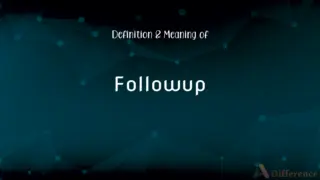
Previous Term
Followup Definition and Meaning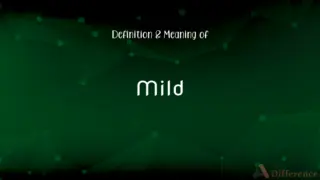
Next Term
Mild Definition and MeaningAuthor Spotlight
Written by
Tayyaba RehmanTayyaba Rehman is a distinguished writer, currently serving as a primary contributor to askdifference.com. As a researcher in semantics and etymology, Tayyaba's passion for the complexity of languages and their distinctions has found a perfect home on the platform. Tayyaba delves into the intricacies of language, distinguishing between commonly confused words and phrases, thereby providing clarity for readers worldwide.
Co-written by
Urooj ArifUrooj is a skilled content writer at Ask Difference, known for her exceptional ability to simplify complex topics into engaging and informative content. With a passion for research and a flair for clear, concise writing, she consistently delivers articles that resonate with our diverse audience.









